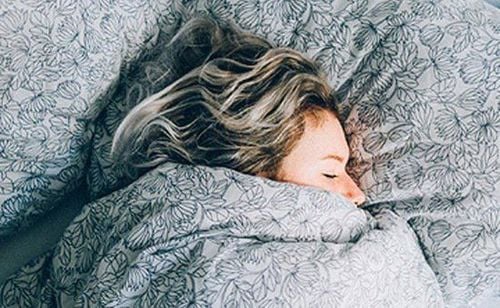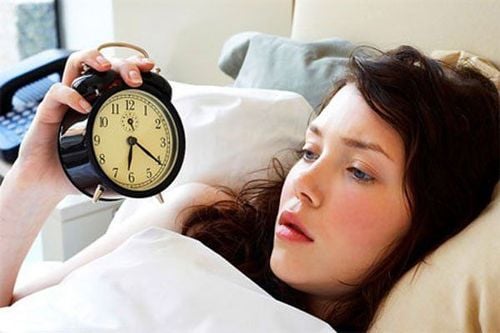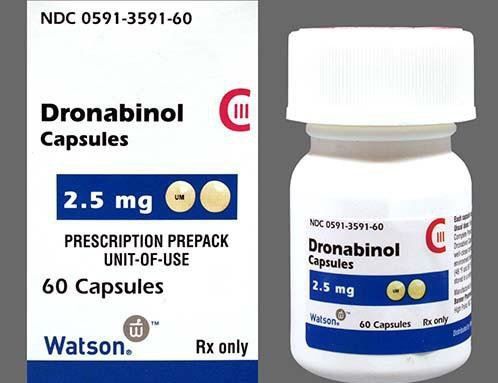This is an automatically translated article.
Insomnia is a common sleep disorder that can make it difficult to fall asleep or stay asleep or wake up too early. Chronic insomnia can have many causes, both in terms of physical and mental health. In which, the common diseases causing insomnia are chronic pain, cancer, diabetes.
1. What is Chronic Insomnia?
Insomnia is a common sleep disorder that makes it difficult for you to fall asleep or to fall asleep or to wake up too early. Insomnia is considered chronic if it persists for more than 1 month.
In addition to difficulty sleeping at night, chronic insomnia also has the following symptoms:
Waking up too early A lot of walking during the night Feeling of not being rested after a night of sleep Excessive daytime fatigue or daytime sleepiness Anxiety or depression Difficulty concentrating, inability to think and remember Increased errors, slow reactions, and accident proneness Continuity of anxiety about sleep Watch now: Persistent chronic insomnia: Don't give up contain

Mất ngủ vì bị ốm khiến bạn mệt mỏi
2. Causes of Chronic Insomnia
Chronic insomnia can have many causes, both physical and mental health. Among them, stress, changing circadian rhythms and bad habits before going to bed are common causes of chronic insomnia.
Stress. Worries and stress about work, school, health, finances or family can make the body start to work more at night, leading to insomnia. Life events or trauma that cause stress – such as the death or illness of a loved one, divorce or job loss – can also lead to chronic insomnia. Work or business schedule. The body's circadian rhythm acts as an internal clock, guiding the sleep-wake cycles, metabolism and temperature. Circadian rhythm disturbances can lead to insomnia. Specific causes include commuting work at many times, working too early or frequently changing working hours. Bad bedtime habits including irregular bedtimes, pre-sleep triggering activities, an uncomfortable sleeping environment, or a bedroom being used as a place to work, eat, or view electronic devices death. Using computers, televisions, video games, smartphones, or other screens right before bed affects the sleep-wake cycle. Eating too much in the evening makes the body feel uncomfortable when lying down, even heartburn, reflux of acid and food from the stomach into the esophagus. Medicine; Many prescription drugs interfere with sleep, such as medications for asthma or blood pressure, and some antidepressants. Many over-the-counter medications — such as some pain relievers, cold and allergy medications, and weight loss products — often contain caffeine and other stimulants that can disrupt sleep. Caffeine, nicotine and alcohol. Tea, coffee, cola and drinks containing caffeine are nervous system stimulants. If you take these substances in the late afternoon or evening, they can make it difficult to sleep at night. Nicotine in cigarettes is a stimulant that interferes with sleep. Alcohol can help you fall asleep, but it blocks the deeper stages of sleep and often keeps you awake in the middle of the night. Change sleep patterns. As we age, sleep often becomes less restful, so noise or other changes in the environment are more likely to wake older people. With age, the body's internal biological clock is also disturbed, so older people will feel more tired in the evening and wake up earlier in the morning. But older people generally still need the same amount of sleep as younger people. No exercise: Little or no physical activity can interfere with a good night's sleep. In addition, the more sedentary you are, the more likely you are to take daily naps, which can interfere with sleep at night.
3. Medical conditions that can cause chronic insomnia
Unlike acute insomnia, which is often caused by illness or stress - chronic insomnia diseases can lead to chronic insomnia.
Medical conditions that can cause chronic insomnia include:
Chronic pain (back pain, arthritis) Bladder and prostate disease causing frequent urination Cancer Diabetes causing insomnia chronic, especially when blood sugar is not stable. Cardiovascular disease Asthma Gastroesophageal reflux disease (GERD) Hyperthyroidism Parkinson's disease and Alzheimer's Disease Mental health disorders such as anxiety disorders, depression, bipolar disorder, obsessive compulsions or post-traumatic stress disorder (PTSD) may be responsible for disrupting sleep and causing chronic insomnia. Waking up too early can also be a sign of depression. Sleep-related disorders. Sleep apnea causes the person to stop breathing periodically throughout the night, disrupting sleep. Restless legs syndrome causes discomfort in your legs and an almost irresistible urge to move, which can make it impossible for a person to sleep.

Duy trì hoạt động thể dục thể thao thường xuyên giúp thúc đẩy giấc ngủ ngon
4. How to prevent insomnia?
Good sleep habits can help prevent insomnia and promote good sleep :
Keep bedtime and wake times consistent every day, including weekends. Exposure to sunlight every morning can help set the circadian clock. This morning routine will make it easier to fall asleep at night. Maintaining regular physical activity helps promote good sleep. Check medications to see if they may be contributing to insomnia. Avoid or limit napping. Avoid or limit caffeine, alcohol, and no nicotine use. Avoid eating a lot and drinking a lot before going to bed. The bedroom needs to be comfortable for sleeping and used only for sleeping. Relax before bed, such as taking a warm bath, listening to soft music, or reading a book. In addition, you need to avoid electronic devices at least 1 hour before bedtime. Light from device screens is not only harmful to eyes and sleep, but most people scroll through social media or watch news or stimulating programs. These interfere with the brain's ability to relax.
Chronic insomnia can have many causes, both physical and mental health. Therefore, you need to understand the causes of insomnia to have treatment and visit when necessary.
Follow Vinmec International General Hospital website to get more health, nutrition and beauty information to protect the health of yourself and your loved ones in your family.
Please dial HOTLINE for more information or register for an appointment HERE. Download MyVinmec app to make appointments faster and to manage your bookings easily.
References: webmd.com, mayoclinic.org













